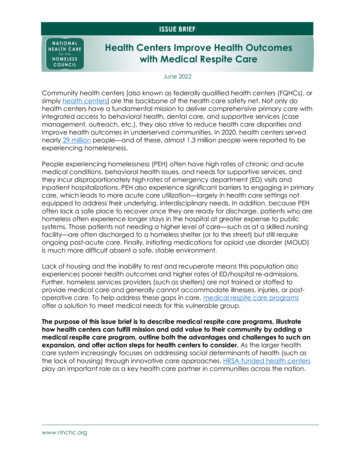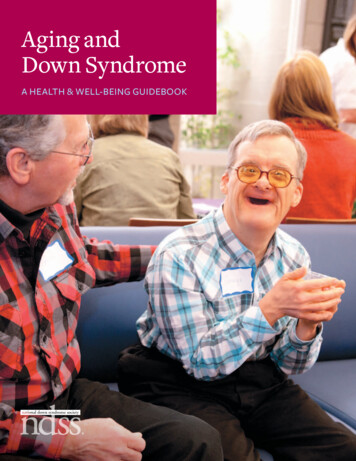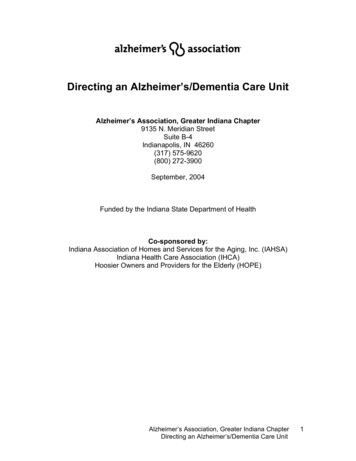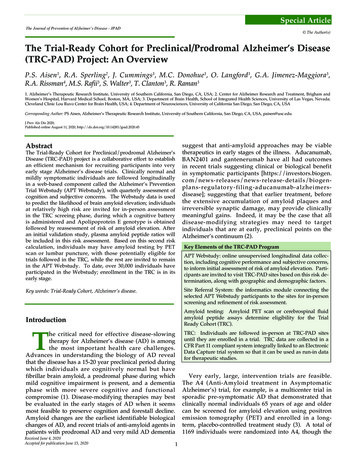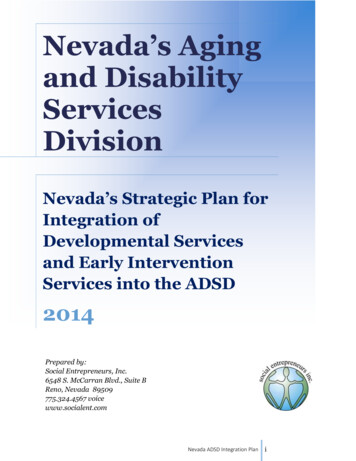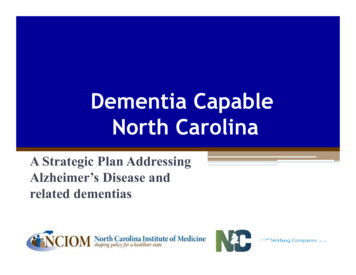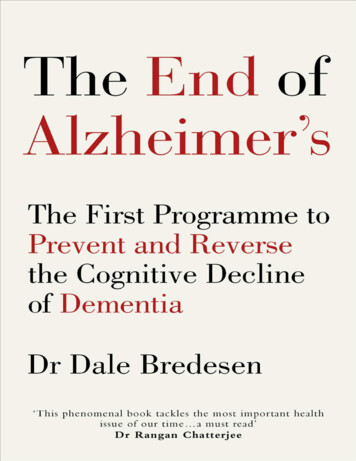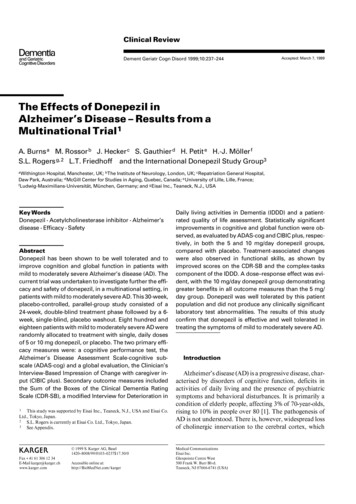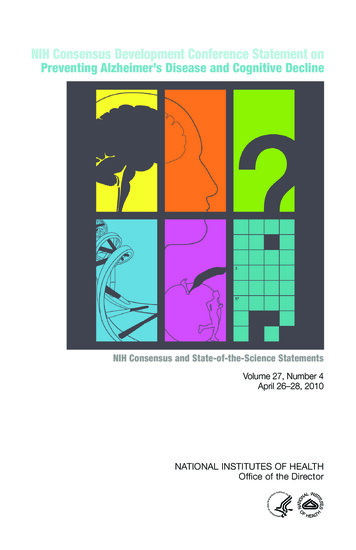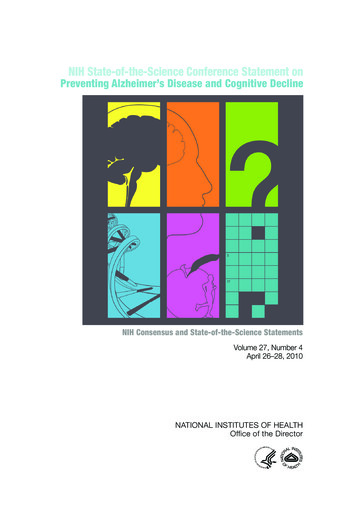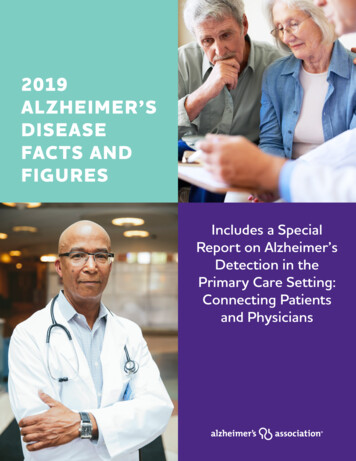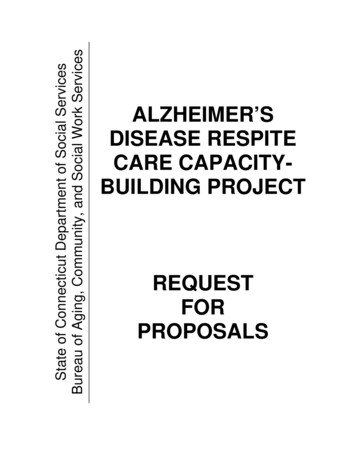
Transcription
State of Connecticut Department of Social ServicesBureau of Aging, Community, and Social Work ServicesALZHEIMER’SDISEASE RESPITECARE CAPACITYBUILDING PROJECTREQUESTFORPROPOSALS
STATE OF CONNECTICUT DEPARTMENT OF SOCIAL SERVICESBureau of Aging, Community, and Social Work ServicesALZHEIMER’S DISEASE RESPITE CARE CAPACITY-BUILDING PROJECTRequest for ProposalsThe State of Connecticut Department of Social Services (Department) Bureau ofAging, Community, and Social Work Services (Aging Services Division) is requestingproposals from organizations to expand respite care options for persons withAlzheimer’s disease and their families/caregivers particularly those who arephysically frail, geographically isolated, at greatest economic need, and/or atgreatest social need.The Department is requesting proposals for the Alzheimer’s Disease Respite CareCapacity-building Project for the resultant contract period of April 15, 2008 to June30, 2009. In addition, RFP proposed respite care options must be operational on theresultant contract start date of April 15, 2008. The Department expects to award upto five resultant contracts. The total available funding through this procurement shallnot exceed 535,000. A total of 225,000 in funding will be made available for theperiod of April 15, 2008 to June 30, 2008. The remaining 310,000 will be availablefor the period of July 1, 2008 to June 30, 2009. Awarded funds must be expendedduring the time periods noted above. This procurement is one-time only fundingfor capacity-building efforts. The Department expects this effort to be sustained bythe resultant contractor for a minimum of two years beyond the resultant contractperiod.Interested bidders must submit a mandatory Letter of Intent to the Department nolater than 3:00 p.m. eastern standard time on February 28, 2008. Proposals must bereceived at the Department no later than 3:00 p.m. eastern standard time on March26, 2008. Proposals received after the stated due date and time may be accepted bythe Department as a clerical function but will not be evaluated. Those proposals thatare not evaluated shall be retained for thirty days after the resultant contracts areexecuted, after which the proposals will be destroyed. All proposals must be insealed envelopes or sealed boxes clearly identified as “Alzheimer’s Disease RespiteCare Capacity-building Project RFP.”
To download this RFP, access the States’ Procurement/Contracting Portal at theState of Connecticut Department of Administrative Services’ Procurement ServicesHome Page at www.das.state.ct.us/Purchase/Portal/Portal home.asp or call orwrite:Dorothy DiLerniaState of Connecticut Department of Social ServicesContract Administration25 Sigourney StreetHartford, CT 06106Telephone: 860-424-5056Fax: 860-424-4953E-mail: Dorothy.DiLernia@ct.govThe Department is an Equal Opportunity/Affirmative Action Employer. Deaf andhearing-impaired persons may use a TDD by calling 1-800-842-4524. Questions orrequests for information in alternative formats must be directed to the ContractAdministration Office at 860-424-5693. The Department reserves the right to rejectany and all proposals or cancel this procurement at any time if it is deemed in thebest interest of the State.
CONTENTSPageAcronyms, Abbreviations, and Definitions. 1Section I - Overview of the Department and the Project . 4A.Purpose of Request for Proposals. 4B.Overview of the Department of Social Services . 4C.Overview of the Aging Services Division . 5D.Overview of the Project . 6Section II - Overview of This Procurement Process. 11A.Issuing Office and Administration . 11B.Procurement Schedule . 12C.Mandatory Letter of Intent . 12D.Bidder’s Questions . 13E.Evaluation and Selection . 13F.Contract Execution . 13G.Bidder Debriefing. 14H.Rights Reserved . 14I.Proposal Presentation Expenses . 16J.Proposal Due Date and Time . 16K.Acceptance of Proposal Contents . 16L.Bidder Assurances . 17M.Freedom of Information . 18N.Affirmative Action. 18O.Resultant Contract Period . 19Section III - General Proposal Requirements and Structure . 19A.General Proposal Requirements . 19B.Instructions for Proposal Structure . 20Section IV - Proposal Contents . 21A.Transmittal Communication, Forms, and Acceptances . 21B.Organizational Capability and Structure . 24C.Scope of Services. 29D.Business Cost Section. 33Section V - Proposal Evaluation. 34A.Overview of the Evaluation of Proposals . 34B.Phase One - Evaluation of General Proposal Requirements andStructure. 34C.Phase Two - Evaluation of the Organizational Capability andStructure. 35D.Phase Three - Evaluation of the Scope of Services . 35E.Phase Four - Evaluation of the Business Cost Section . 35F.Phase Five - Ranking of the Proposals . 36Section VI - Appendices. 37Appendix 1 - Mandatory Terms and Conditions . 38Appendix 2 - Procurement and Contractual Agreements SignatoryAcceptance. 70
Appendix 3 - Workforce Analysis Form . 71Appendix 4 - Notification to Bidders Form . 73Appendix 5 - Smoking Policy. 74Appendix 6 - Certification Regarding Lobbying . 75Appendix 7 - Gift and Campaign Contribution Certification . 76Appendix 8 - Consulting Agreement Affidavit . 78Appendix 9 - Affirmation of Receipt of State Ethics Laws Summary . 79Appendix 10 - Notice to Executive Branch State Contractors andProspective State Contractors of Campaign Contribution andSolicitation Ban. 80Appendix 11 - Work Plan Chart. 82Appendix 12 - Budget Template 83
Acronyms, Abbreviations, and DefinitionsThe following acronyms, abbreviations, and definitions apply to this procurement:1.Activities of Daily Living (ADLs) - Activities persons or people normallyperform, including, but not limited to, any daily activity performed for selfcare (such as self-feeding, bathing, dressing, and grooming), work,homemaking, and leisure. (the ability or inability to perform ADLs can beused as a very practical measure of ability/disability in many disorders)2.Alzheimer’s Association - A non-profit voluntary health organization thatfocuses on care, support, and research for Alzheimer's disease3.Alzheimer’s Disease/Alzheimer Disease/Alzheimer’s (AD) - A progressiveneurodegenerative disease characterized by the loss of function anddeath of nerve cells in several areas of the brain, leading to loss ofcognitive functions such as attention, memory, and language4.Alzheimer’s Disease Education and Referral Center (ADEAR) - A divisionof the National Institute of Aging, one of twenty-seven Institutes andCenters of the National Institute of Health, which leads a broad scientificeffort to understand the nature of aging and to extend the healthy activeyears of life5.Area Agencies on Aging (AAAs) - Five regional, private, non-profitplanning agencies that receive Federal Older Americans Act (Title III)funds and State funds through the Department. (The AAAs operateprograms for the elderly and administers funds to elderly service providersin their communities. The five regional AAAs in Connecticut are: The NorthCentral Connecticut Agency on Aging, The Agency on Aging of SouthCentral Connecticut, Southwestern Connecticut Agency on Aging,Western Connecticut Area Agencies on Aging, and Senior Resources(Eastern Connecticut)6.Business Day - A day during which State of Connecticut offices are openfor business (Monday through Friday excluding State holidays)7.Capacity-building - New development and/or expansion of anorganization’s respite care option(s) for persons with Alzheimer’s diseaseand their families/caregivers, for example, addressing the inability ofclients in a rural region to arrive at an adult day care facility by offeringtransportation services to the facility that were not previously available,extending adult day care hours of operation, or purchasing a personalcomputer to exercise cognitive skills1
8.Case Management - A collaborative process of assessment, planning,facilitation and advocacy for options and services to meet an individual’shealth needs through communication and available resources to promotequality cost-effective outcomes9.Commissioner - The Commissioner of the State of Connecticut Departmentof Social Services, as defined in General Statutes of Connecticut (C.G.S.)§17b-310.Dementia - The progressive decline in cognitive function due to damage ordisease in the brain beyond what might be expected from normal aging11.Department - State of Connecticut Department of Social Services12.Division - The Department’s Aging Services Division within the Bureau ofAging, Community, and Social Work Services13.Down’s Syndrome - Chromosomal disorder that results in mild to severelearning disabilities14.Expend - To use, use up, spend, disburse, or pay out State contractedfunds15.Geographically Isolated Persons - Rural areas that persons live who havelimited access to transportation services16.Greatest Economic Need - An income level at or below 150 percent to 250percent of the Federal poverty level17.Greatest Social Need - A need resulting from non-economic factors thatmay include, but are not limited to, physical and mental disabilities,language barriers, and/or cultural, social, or geographic isolation causedby racial or ethnic status that restricts the ability of an individual to performnormal daily tasks, and/or threatens the capacity of the individual to liveindependently18.Physically Frail Persons - Persons with limitations of at least two activitiesof daily living (ADLs)19.Related Party - Person or organization related through marriage, capabilityto control, ownership, family, or business association20.Related-party Transactions - Transactions between the resultantcontractors and a related party that can include, but are not limited to, realestate sales or leases, leasing for vehicles, office equipment, or householdfurnishings, mortgages, loans, or working capital loans, and contracts for2
management services, consultant services, professional services, e.g.,attorneys and accountants, or for material, supplies, or other servicespurchased by the resultant contractors21.Respite Care Services - Services offered on a short-term basis, designedto provide a break from the constant physical and emotional stress ofcaring for a person with Alzheimer’s Disease22.Subcontract - Any written agreement between a resultant contractor andanother party to fulfill any contract requirements23.Systems Change - A process in which improvements are made to existingprotocols that result in greater accessibility and a more efficient delivery ofservices24.U.S. Code - A compilation and codification of the general and permanentFederal law of the U.S.3
SECTION I - OVERVIEW OF THE DEPARTMENT AND PROJECTA.PURPOSE OF REQUEST FOR PROPOSALSThe Department’s Bureau of Aging, Community, and Social WorkServices, Aging Services Division is requesting proposals fromorganizations to expand respite care options for persons with Alzheimer’sdisease and their families/caregivers particularly those who are physicallyfrail, geographically isolated, at greatest economic need, and/or atgreatest social need. This RFP seeks to fund organizations that will,through new development and/or expansion of existing programs,increase the availability of and accessibility to respite care for persons withAlzheimer’s disease and their families/caregivers.Bidders that propose the use of subcontractors must present the sameinformation about the proposed subcontractors as for bidders. Use ofsubcontractors is subject to the approval of the Department.B.OVERVIEW OF THE DEPARTMENT OF SOCIAL SERVICESThe Department provides a broad range of services to older adults,persons with disabilities, families, and persons who need assistance inmaintaining or achieving their full potential for self-direction, self-reliance,and independent living. It administers more than ninety legislativelyauthorized programs and about one-third of the State budget. By statute, itis the State agency responsible for administering human service programssponsored by Federal legislation including the Rehabilitation Act, the FoodStamp Act, the Older Americans Act, and the Social Security Act. TheDepartment is also designated as a public housing agency foradministering the Section 8 Program under the Federal Housing Act.The Department is headed by the Commissioner of Social Services andthere are Deputy Commissioners for Administration and Programs. Thereis a Regional Administrator responsible for each of the three serviceregions. By statute, there is a Statewide Advisory Council to theCommissioner of Social Services and each region must have a RegionalAdvisory Council.The Department administers most of its programs at offices locatedthroughout the State. Within the Department, the Bureau of RehabilitationServices provides vocational rehabilitation services for eligible personswith physical and mental disabilities throughout the State. For the otherprograms, services are available at offices located in the three geographicservice regions, with central office support located in Hartford. In addition,4
many services funded by the Department are available throughcommunity-based agencies. The Department has out-stationedemployees at participating hospitals and nursing facilities to expediteMedicaid applications and funds Healthy Start sites, which can acceptapplications for Medicaid for pregnant women and young children. Manyof the services provided by the Department are available via mail ortelephone.There are three entities attached to the Department for administrativepurposes only. They are the Commission on Deaf and Hearing-impaired,the Board of Education and Services for the Blind, and the Child Day CareCouncil.C.OVERVIEW OF THE AGING SERVICES DIVISIONThe Aging Services Division (Division) ensures that Connecticut’s eldershave access to the available services necessary to live with dignity,security, and independence. The Division is responsible for planning,developing, and administering a comprehensive and integrated servicedelivery system for older persons in Connecticut.The Division conducts needs assessments, surveys methods of serviceadministration, evaluates and monitors such services, maintainsinformation and referral services, and develops, coordinates, and/orcollaborates with other appropriate agencies to provide such services.The Division administers Older Americans Act programs for supportiveservices, in-home services, and congregate and home-delivered meals.The Division also administers programs that provide senior communityemployment, health insurance counseling, and respite care for caregivers.Respite Care Programs - The Department currently administers twoprograms that address the respite needs of persons with Alzheimer’sdisease and their families/caregivers: The Connecticut Statewide Respite Care Program provides shortterm respite care, case management, information, and supportgroups to persons with Alzheimer’s disease and theirfamilies/caregivers. Income and asset guidelines apply and themaximum funding available per year per family is 3,500. The National Family Caregiver Support Program providesinformation, referral, support, and respite services to individualswho are sixty years old and older and their families/caregivers, andgrandparents raising grandchildren. There are no income or asset5
guidelines. The program offers a maximum benefit of 3,500 perfamily per year for respite care.The Connecticut Statewide Respite Care Program and The NationalFamily Caregiver Support Program are administered through the AreaAgencies on Aging (AAAs) in Connecticut, with the Alzheimer’sAssociation, Connecticut Chapter collaborating through the ConnecticutStatewide Respite Care Program.D.OVERVIEW OF THE PROJECTPurpose of Project - The purpose of the Alzheimer’s Disease Respite CareCapacity-building Project is to promote systems change by addressing thelimited availability of and access to respite care to persons withAlzheimer’s disease and their families/caregivers.Need for Project – Alzheimer’s Disease (AD), a progressive degenerativedisease of the brain, is the most common form of dementia. Discoveredand described in 1906 by Dr. Alois Alzheimer, Alzheimer’s disease nowaffects approximately four million Americans. Unless a cure or method ofprevention is found, it is estimated that the number of Americans withAlzheimer’s disease will climb to fourteen million by the middle of the nextcentury. Although Alzheimer’s disease is not a normal part of aging, one inten persons over age sixty-five and nearly half of those over age eightyfive may have the disease. A small percentage of people in their thirtiesand forties also develop the disease. Although Alzheimer’s diseaseeventually results in death, the disease can progress for years. A personwith Alzheimer’s disease lives an average of eight years, but can live asmany as twenty years or more from the onset of symptoms.Families/caregivers of persons with Alzheimer’s disease face achallenging and sometimes terrifying future caring for a loved one who canno longer care for themselves and in periodic instances of lucidity cancognate that they are losing their mind. The stress of care giving forsomeone with Alzheimer’s disease takes its toll on families/caregiversphysically, emotionally, and financially. It divides families/caregivers and inmany instances isolates the families/caregiver from the world outside theirresponsibilities of care giving.According to a government study, more than seven out of ten people withAlzheimer’s disease live at home, where almost 75 percent of their care isprovided by families and friends. The remainder, as reported in “TheEconomic Burden of Alzheimer’s Disease” by DP Rice, is paid carecosting an average of 12,500 per year. Families/caregivers pay almost allof this out of pocket. According to estimates used by the Alzheimer’sAssociation and the National Institute on Aging, national direct and indirect6
annual costs of caring for persons with Alzheimer’s disease are at least 100 billion. In addition, the Alzheimer’s Association reports thatAlzheimer’s disease costs American business 61 billion a year. Of thatfigure, 24.6 billion covers Alzheimer’s disease health care and 36.5billion covers costs related to care giving for persons with Alzheimer’sdisease, including lost productivity, absenteeism, and worker replacement.Focus of Project - The focus of the Alzheimer’s Disease Respite CareCapacity-building Project is to develop a new project and/or expand asuccessful model to increase the accessibility and overcome barriers toparticipation for persons with Alzheimer’s disease and theirfamilies/caregivers.1. Current System and Major Barriers - The resultant contractors shalldevelop new and/or expand the current system of respite care topersons with Alzheimer’s disease and their families/caregivers andovercome the major barriers to participation.2. Proposed Intervention: New Development and/or Expansion ofServices - The resultant contractors shall develop a new projectand/or expand a successful model to increase the accessibility ofpersons with Alzheimer’s disease and their families/caregivers torespite care in their community.Expansion of services may include, but not be limited to, additional projectfunctions, expanded geographical coverage, and/or expanded targetpopulation.Additional project functions - may include, but are not limited to:a)Multifaceted team approach to working with families thatincorporates the skills of a variety of agencies and results ina comprehensive array of services and supports delivered toproject participants through community collaborationsb)New technology to deliver services, such as computerassisted monitoring equipmentc)Development and provision of “extended-hours care” forpersons with Alzheimer’s disease and theirfamilies/caregivers, such as evening adult care hours andnight-time meal preparationd)Development of mobile respite care7
e)Volunteer use for coordinating flexible respite options forfamilies/caregivers that may include the development of avolunteer-based peer mentoring and support program forfamilies/caregiversf)Expanded transportation options to get participants to andfrom respite servicesg)Capacity-building efforts to serve special populations withAlzheimer’s disease such as individuals diagnosed withDown’s Syndrome3. Geographical Coverage - Successful proposals shall identifycurrently served and proposed expanded cities and/or towns withinthe State of Connecticut.4. Target Population - Within the community of persons withAlzheimer’s disease, there are certain hard-to-reach groups.Successful proposals shall include a service plan that demonstratesan understanding of the targeted special populations and howthese groups may be expanded. These groups include:a)Physically Frailb)Geographically Isolatedc)Greatest Economic Needd)Greatest Social Need5. Timeline for Project Implementation - The project requires adetailed, well-organized timeline that reflects and is consistent withthe description of the proposed intervention and business costproposal. The project timeline shall set forth the proposed project’sobjectives and the major tasks/action steps that will be undertakento achieve the stated objectives.6. Project Objectives and Evaluation - Measurable objectives arecritical to ensure that the project’s success can be substantiated.An objective is an observable end result such as the number ofpeople to be served, the number of people to be trained and/or theimpact on a specific situation or problem, i.e., because of theincreased availability of services, “X” number of additionalfamilies/caregivers will be able to avail themselves of a respiteoption.8
7. Community Collaboration - Projects must effectively use acollaborative approach including partnership with communityorganizations. The resultant contractors shall involve communitybased organizations in the implementation of their project.Successful proposals shall include a plan for collaboration withother organizations including the existing regional project partnersof the Statewide Respite Care Program in Connecticut to provide aseamless provision of services and improve responsiveness topersons with Alzheimer’s disease and their families/caregivers. Theexisting partners are:a)The Alzheimer’s Association, Connecticut Chapterb)The Department of Social Services, Aging Services Divisionc)Area Agencies on Aging (AAAs)8. Sustainability - The project requires viable sustainable services fora minimum of two years beyond the end of the resultant contractperiod. The resultant contractors shall develop a plan for two-yearsof sustainable services to clients in the Connecticut StatewideRespite Care Program beyond the end of the resultant contractterm.9. Technical Assistance - Specific Department responsibilities are:a)Program Management - A Program Manager will beappointed by the Department. The individual will beresponsible for monitoring project progress and will havefinal authority to approve/disapprove project deliverables.b)Staff Coordination - The Program Manager will coordinate allneeded contacts between the resultant contractor andDepartment staff.c)Approval of Deliverables - The Program Manager will review,evaluate, and approve all deliverables prior to the resultantcontractor being released from further responsibility.d)Policy Decisions - The Department retains final authority formaking policy decisions affecting completion of theAlzheimer’s Disease Respite Care Capacity-building Project.In addition, the Department shall:(1)Monitor the resultant contractor’s performance andrequest updates, as appropriate9
(2)Respond to written requests for policy interpretations(3)Provide technical assistance to the resultantcontractor, as needed(4)Allow access to Department automated databases, asavailable and permitted(5)Allow access to management reports and case files,as appropriate(6)Schedule and hold regular project meetings with theresultant contractor(7)Provide a process for and facilitate open discussionswith staff and personnel to gather informationregarding recommendations for improvement(8)Provide data as required by the resultant contractor toperform the functions of the Alzheimer’s DiseaseRespite Care Capacity-building Project.10. Reporting Requirements – These reports may include, but not belimited to, qualitative and quantitative measures, narrative reportingof highlights and accomplishments, documentation of anyprogrammatic challenges and corrective action plans, and results ofclient satisfaction surveys. The resultant contractor shall beexpected to fully cooperate with the data collection and reportingrequirements established by the Department and with anyDepartment staff performing contract-monitoring functions.11. Comprehensive Risk Understanding - The overall focus of theAlzheimer’s Disease Respite Care Capacity-building Project is toseamlessly provide respite care for persons with Alzheimer’sdisease and their families/caregivers. The resultant contractorsshall be sensitive to the needs and circumstances of individualmembers and the policy requirements of the Department. TheDepartment looks forward to a relationship with a resultantcontractor who will anticipate risks and propose solutions toproblems that prevent participants from using Alzheimer’s DiseaseRespite Care Capacity-building Project.10
SECTION II - OVERVIEW OF THIS PROCUREMENT PROCESSA.ISSUING OFFICE AND ADMINISTRATIONThe Department of Social Services is issuing this RFP through its Office ofContract Administration - Procurement Unit. The Contract Administration Procurement Unit is the Issuing Office for this procurement and is the onlycontact in the State of Connecticut for this procurement. The integrity ofthe procurement process is based in part on ensuring that all potential andintended bidders be afforded the same information and opportunitiesregarding the terms of the procurement. Therefore, it is incumbent on theIssuing Office to monitor, control, and release information pertaining to thisprocurement. Potential and intended bidders are advised that they mustrefrain from contacting any other office within the State of Connecticut orany other State employee with questions or comments related to thisprocurement. Potential and intended bidders who contact others within theState of Connecticut with questions or issues pertaining to thisprocurement may risk disqualification from consideration. Decisionsregarding such disqualification will be made by the Department of SocialServices’ Contract Administrator within the Issuing Office, afterconsultation with the Office of the Commissioner. The contact informationfor the Issuing Office is:Dorothy DiLerniaState of Connecticut Department of Social ServicesContract Administration25 Sigourney StreetHartford, CT 06106Telephone: 860-424-5056Fax:
Hartford, CT 06106 Telephone: 860-424-5056 Fax: 860-424-4953 E-mail: Dorothy.DiLernia@ct.gov . Within the Department, the Bureau of Rehabilitation Services provides vocational rehabilitation services for eligible persons with physical and mental disabilities throughout the State. For the other .

